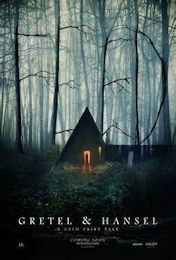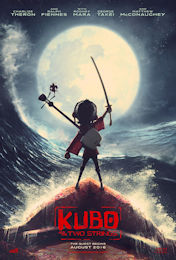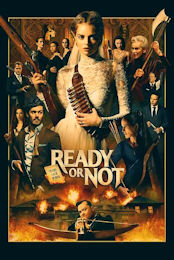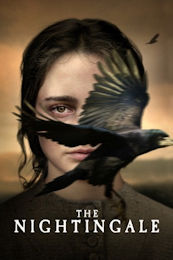
 My five-year-old decided that we should watch Gretel & Hansel today. I'd probably pointed out that it was a "spooky movie" to her and the rating was only PG-13, so I figured she'd be perfectly fine watching it. Given a lot of the stuff she's watched, I didn't figure it'd be a problem, beyond the fact that it might bore her.
My five-year-old decided that we should watch Gretel & Hansel today. I'd probably pointed out that it was a "spooky movie" to her and the rating was only PG-13, so I figured she'd be perfectly fine watching it. Given a lot of the stuff she's watched, I didn't figure it'd be a problem, beyond the fact that it might bore her.
She ended up enjoying it. Fortunately the film isn't overly long, which works to the benefit of both adults and children, though I can't imagine many children watching this film, other than mine.
It's a lush but dark film (tonally as well as visually), giving a more realistic treatment to the Grimm's oeuvre. Gretel is a teenager with a dead father and a mentally unstable mother who, along with her kid brother Hansel, is cast out into the wilderness to fend for herself. Everything is a dark, gritty squalor of indeterminately plague-y time period. Her local job prospects are of the creepy rape-related variety, so - when their mother starts to lose grip - they set off on a journey, first to a local widow's house, where they're accosted by some sort of ghoul man. It's never particularly explained one way or another, but they're saved by a typically Grimm-ian woodsman, who puts an arrow through the pseudo-ghoul's skull, feeds them, and sends them off with directions to reach a group of foresters who will take them in and train them. That's an interesting enough concept on its own, really, but along the journey they're waylaid by hunger. Hansel does a lot of whining and eventually they're forced to sup on mushrooms, which are of course of the hallucinogenic variety. It's at this point that you could create a sense of unreliable narration, as you're dealing with two characters featured tripping their balls off in the woods. The rest could have been played as a "was it real or not?" mind game, but the movie is earnestly allegorical and straightforward in a way that doesn't really fit in with that possibility. So we end up with our children arriving at a lodge in the woods, curious at its delicious scents. Hansel breaks in and finds tables full of food. They're of course greeted by the legendary witch and urged to fatten up with her never-ending supply of delicious victuals.
While by this point the movie is interesting enough, their journey wasn't particularly compelling. There's some interesting storytelling in the village, with their mother, with the woodsman, but the actual traveling leaves a lot to be desired. Fortunately, though it felt like it was heading somewhere tedious, it ended up not being much longer than it had to be, saving us from the film turning into The Nightingale.
But everything after this point departs from the typical legendary aspects of the tale and delves a lot deeper into the metaphors that you get brief glimpses of in the early scenes. Gretel is a teen with responsibility in a world where that carries a great burden. Her brother is more her child than her mother's at this point and there are many allusions to Hansel's interference with Gretel having her own life and own identity, a theme that continues to be delved into heavily, as well as the development of womanhood and finding internal power. This is the section of the movie that I feel like makes it worthwhile. We get to hear from the witch, a much more interesting figure than something out of a fairy tale. I wouldn't say Oz Perkins attempts to make the witch sympathetic, but makes her understandable, even in the end. By the conclusion, I wasn't sure if it'd be more interesting to see Gretel side with the witch or her brother. (I probably prefer the former.)
The fact that the movie works well is due in large part to everyone being fairly perfectly cast. Well, maybe there's one exception, depending on the director's intent as to how we're supposed to feel about the character: Samuel Leakey's performance as Hansel is often truly Jake Lloyd-ian. If we're supposed to find Hansel to be a tremendous annoyance standing in the way of Gretel's personal development and survival, it's pitch-perfect. Otherwise... Now this is pod racing.
Other than Leakey, we have Sophia Lillis performing far beyond her age - probably why she's had so many major roles in the past three years - as Gretel and Alice Krige - who is pretty much always great in everything - as the witch. I could watch scenes of them talking to each other all day. There is only three other speaking roles of note, making it easy to stock such a slimly-cast movie with top-shelf acting talent. In that way, it's very similar to Perkins' The Blackcoat's Daughter. Also, it continues his themes of mental illness, the perils and darkness of life as a teenager, familial loss, demonic entities, and finding good actresses that can believably play teenagers.
The visuals are similar to The Blackcoat's Daughter, but slightly more colorful and less desaturated, even if it's just as dark. The more fantastical elements are exceptionally appealing, showing some real flair for something that probably didn't have much budget. Still it manages to wow with the visual choices made.
For something that's a meditation on puberty, growth, finding yourself, and the very shaky bonds of familial connection, coated in the trappings of a classic fairy tale, it keeps you engaged and invested in the characters and the tale, apparently even if you're a five-year-old.


 My next choice to watch with my five-year-old was Kubo And The Two Strings, largely because of the impressive stop-motion model work done in the film. They're not really making movies like this anymore and it seemed thematically more interesting than your average kid's film.
My next choice to watch with my five-year-old was Kubo And The Two Strings, largely because of the impressive stop-motion model work done in the film. They're not really making movies like this anymore and it seemed thematically more interesting than your average kid's film.

 My five-year-old decided that we should watch Gretel & Hansel today. I'd probably pointed out that it was a "spooky movie" to her and the rating was only PG-13, so I figured she'd be perfectly fine watching it. Given a lot of the stuff she's watched, I didn't figure it'd be a problem, beyond the fact that it might bore her.
My five-year-old decided that we should watch Gretel & Hansel today. I'd probably pointed out that it was a "spooky movie" to her and the rating was only PG-13, so I figured she'd be perfectly fine watching it. Given a lot of the stuff she's watched, I didn't figure it'd be a problem, beyond the fact that it might bore her.

 The Nightingale is an Australian film about a 19th century Irish convict woman hunting a pack of British soldiers across the wilds of Tasmania to avenge the death of her family. On the surface, that probably sounds like an interesting film, but I can't say I felt that way in viewing it. It is well-made, it is beautifully-filmed, it shows off the lush untouched environments in a way you'll probably never see in another film, but I can't say I particularly enjoyed watching it.
The Nightingale is an Australian film about a 19th century Irish convict woman hunting a pack of British soldiers across the wilds of Tasmania to avenge the death of her family. On the surface, that probably sounds like an interesting film, but I can't say I felt that way in viewing it. It is well-made, it is beautifully-filmed, it shows off the lush untouched environments in a way you'll probably never see in another film, but I can't say I particularly enjoyed watching it.